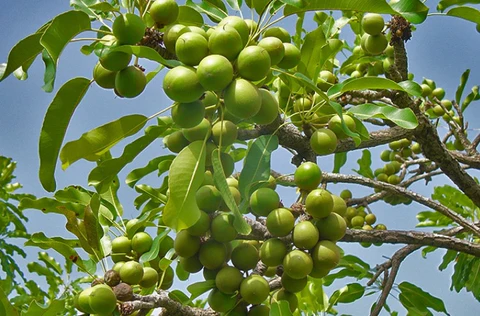Nutrition
Benefits of velvet tamarind

VELVET tamarind (dialium guineense) commonly known as ‘icheku’ in igbo, ‘awin’ in yoruba and ‘tsamiyar- kurm’ in hausa, and ‘Yooyi’ in Ghana.
-High Antioxidant Power: The fruit is a good source of vitamin C and its consumption can contribute to satisfying the journal requirement that is 90 to 110 mg.
-Treats Scurvy and Infections: The fruit pulp has high ascorbic acid content vitamin hence used as a food supplement. The high vitamin C content boosts the immune system and helps the body against infections.
-Healing Wounds: The velvet fruit pulp has interesting content in calcium and magnesium. Calcium participates in ossification, to the muscular contraction, and to the blood clotting.
-Repairs blood vessel and fights Anemia: The velvet tamarind fruit pulp is rich in iron. It is indispensable for iron absorption; cloves repair and blood vessel formation via collagen synthesis. The pulp’s iron absorption is more efficient because of the presence of vitamin C.
-Prevention of Hypertension: The values obtained for sodium and potassium of the velvet tamarind fruit pulp were respectively Preliminary studies indicate that short-term potassium depletion also elevates bloodpressure in hypertensive patients. Potassium supplementation lowers blood pressure in hypertensive patients ingesting normal amounts of sodium.
-Reliefs Menstrual Cramp and stops Diarrhoea: The stem bark extract has significant analgesic property hence, can be used to reduce menstrual pain. You can take it along with papaya leaf, salt, and water to work effectively. It can also stop diarrhea.
-Hemorrhoids (pile): Piles are swollen veins in the anal canal caused by too much pressure in the pelvic and rectal areas and while not life-threatening, these veins can be very painful. A study performed on ethanolic leaves extract of velvet tamarind showed it to be beneficial for pile treatment.
Source: eprojectlibrary.com
Nutrition
Benefits of sheabutter

Shea butter is a fatty substance derived from the nuts of the African shea tree. Sheabutter has gained popularity in the Western world as a natural alternative to traditional beauty products and as a food ingredient.
Unrefined, raw shea butter is the best option for food preparation as it has not been treated with any chemicals and retains its natural properties.
-Shea butter is also a good source of vitamins and minerals. It is particularly rich in vitamin A and vitamin E, which are both known to be beneficial for the skin. Vitamin A is essential for maintaining healthy skin and eyes, while vitamin E is an antioxidant that can help to protect the skin from damage caused by UV rays and environmental toxins. Shea butter also contains small amounts of other vitamins and minerals such as vitamin K, vitamin F, and zinc. Shea butter is a good source of monounsaturated and polyunsaturated fats.
-Traditionally, Shea butter is used in cooking. It is used as a cooking oil, as well as an ingredient in soups, stews, and porridges. Another way Shea butter is consumed is as a spread on bread and as a dip for vegetables. It is also an ingredient used to make a type of fermented porridge called koko, which is made with millet, sorghum, or other grains and flavored with spices, peanuts, and Shea butter. Additionally, Shea butter is used in some traditional confections and candy sweets.
– Shea butter has been traditionally used to treat a variety of skin conditions such as eczema and psoriasis. Its anti-inflammatory properties may also be beneficial for those with joint and muscle pain.
-Eating shea butter may also benefit weight management as it is relatively low in calories and high in healthy fats. It can help to keep you feeling full and satisfied, which can help to prevent overeating and weight gain.
-As previously mentioned, Shea butter is also rich in vitamins and nutrients. It is a great source of Vitamin E that helps maintain healthy skin and eyes, and strengthen the body’s immune system against illness and infection.
Join our WhatsApp Channel now!
https://whatsapp.com/channel/0029VbBElzjInlqHhl1aTU27
Nutrition
Nutrition as smart economics: Why Ghana must invest in it
When national development is discussed, the spotlight often falls on roads, factories, employment, and technology. Yet, one of the most powerful engines of economic growth remains overlooked: nutrition. A well-nourished population is not just healthier, it is smarter, more productive, and better positioned to drive Ghana’s transformation.
The hidden cost of malnutrition
Malnutrition is not only a public health crisis; it is a silent drain on the economy. According to the Ghana Demographic and Health Survey (GDHS 2022), countries lose up to 3percent of GDP annually due to poor nutrition. For Ghana, this means billions of cedis lost every year through lower productivity, weaker educational outcomes, and soaring healthcare costs. Malnutrition robs the nation of its human capital; the very foundation of sustainable growth.
Nutrition: An investment, not an expense
The evidence is clear: nutrition delivers some of the highest returns on investment of any development intervention. Every cedi spent on nutrition generates multiple benefits:
Higher productivity: Healthy, well-fed workers contribute more to the economy.
Better education outcomes: Children who eat balanced diets learn faster and perform better in school.
Reduced healthcare costs: Preventing malnutrition lowers the burden of disease and reduces long-term treatment expenses.
In short, nutrition is not charity, it is smart economics. Ghana cannot afford to postpone action.
Why Ghana must act now
Ghana has already made bold commitments at the 2025 Nutrition for Growth (N4G) Summit, pledging to halve child stunting and reduce anemia in women. But without adequate financing and political will, these promises risk becoming empty words.
Nutrition interventions such as exclusive breastfeeding promotion, school feeding programmes, and micronutrient supplementation require sustained investment. Without dedicated budget lines and accountability measures, the cycle of malnutrition will continue to undermine development.
A call for leadership and accountability
Nutrition must be placed at the heart of Ghana’s development strategy. Policymakers, parliamentarians, and development partners need to treat nutrition with the same urgency as infrastructure or energy. Civil society organizations, the media, and citizens must also play their part by demanding accountability and ensuring that nutrition remains high on the national agenda.
The truth is simple: a nation cannot grow on an empty stomach. By investing in nutrition today, Ghana secures a healthier, wealthier, and more resilient future. A nourished Ghana is not just a healthier nation; it is a stronger, more prosperous one, ready to achieve its vision of inclusive growth.






